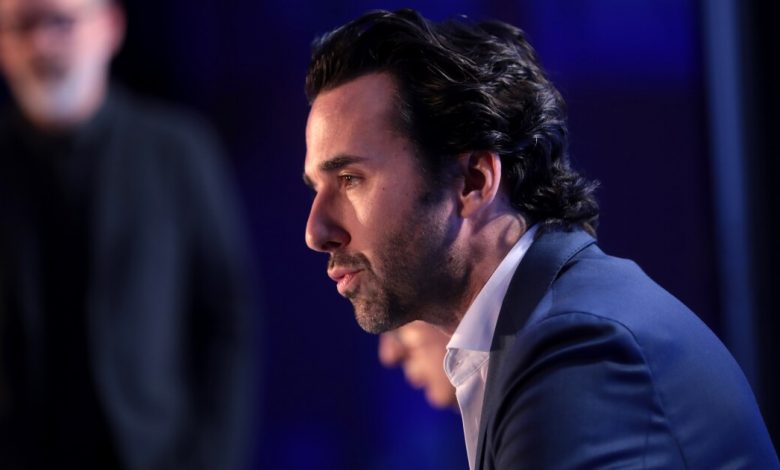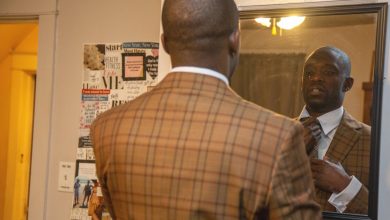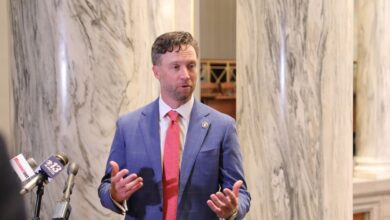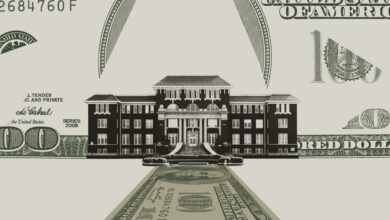At This College, the President Will Now Approve Speakers

After a speaker this month expressed views that many felt were racist, officials at a small private college have cracked down: From now on, all “college sponsored” speakers must be approved by the president and other senior administrators.
Saint Vincent College, a Benedictine institution in Latrobe, Pa., announced the new policy this week in a letter from its president, the Rev. Paul Taylor. The goal, according to the announcement, is “to make sure that the message to be delivered is not in conflict with the spirit and mission of the college.”
The decision comes after David Azerrad, an assistant professor and research fellow at Hillsdale College’s government school, in Washington, D.C., gave a talk at Saint Vincent titled “Black Privilege and Racial Hysteria in Contemporary America.” It was part of a program sponsored by the college’s Center for Political and Economic Thought.
Within the first five minutes, Azerrad asserted that Kamala Harris would not be vice president if it were not for her father’s being Jamaican, and that “the real color of visible privilege in America today is Black.” Hillsdale officials didn’t respond to a voicemail seeking comment from Azerrad on Thursday.
Over the past few years, colleges across the country have grappled with what to do when provocative speakers come to campuses — often by invitation from faculty members or students. Some officials have disinvited speakers in response to criticism from the campus community.
Other campus leaders have denounced the views of speakers but allowed the events to go ahead — citing a commitment to academic freedom and, at public universities, an obligation to comply with the First Amendment. In one recent case, the State University of New York College at Brockport allowed a controversial invited speaker to proceed but moved the event online, citing safety concerns.
But two free-speech experts said Saint Vincent stands out for giving the college’s administration the authority to approve or deny speakers outright. “That is extreme,” said Alex Morey, director of the individual-rights defense program at the Foundation for Individual Rights in Education, known as FIRE.
Father Taylor sees the new policy as a way to protect the college’s mission.
“What this policy does is, it puts first and foremost our mission, first as a liberal-arts university and as a Catholic and Benedictine college, that we respect academic freedom and freedom of speech. But this platform of our college and our mission will not be used for something that is contrary to what we believe,” the president said in an interview.
Legally, Saint Vincent is within its right to impose stricter rules for speakers. Many private colleges have their own guidelines for campus visitors and events, and religious colleges like Saint Vincent often go a step further. For example, Brigham Young University, which is affiliated with the Church of Jesus Christ of Latter-day Saints, requires speakers to use “clean language.”
Saint Vincent, through its status and other policies, has been long been committed to freedom of speech, Morey said.
But Reverend Taylor denied that the new speaker policy violated anyone’s free speech or academic freedom. Inside the classroom and on campus, students and faculty members are encouraged to engage in discussions, debates, and arguments about any topic, he said.
“Every organization has a mission that they abide by, and every one of them does not allow or want someone or something to use that platform for something that is contrary to what they believe in,” he said. “That’s where the critical divide is.”
Jeremy C. Young, senior manager of the free expression and education team for PEN America, a nonprofit working to defend free expression in the United States, believes Saint Vincent’s leaders are missing the mark.
“It’s totally understandable where they’re coming from,” Young said, given the content of Azerrad’s speech. “But the solution is not to get rid of free expression for every speaker and every group on campus.”
The policy’s application, Young added, seems too broad. “What’s a university sponsored speech?” he asked.
Father Taylor said he and his cabinet will now be approving speaking events that are open to the public and “outward facing” in any way. Officials won’t be getting involved when, say, guest lecturers visit classes, he said. The new policy concerns “public presentations sponsored by the college.”
Campus officials have organized virtual “listening sessions” for students to share thoughts on the policy, the president said, and will hold a campus forum on Friday.
Source link






